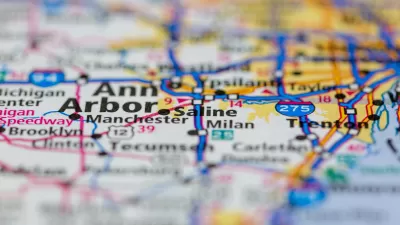More state legislatures are considering fees based on vehicle miles traveled as a replacement for declining gas tax revenues.

As gas tax revenues dwindle thanks to electric and other more fuel-efficient vehicles, states are looking to new sources of transportation funding. But as Jared Brey reports in Governing, a road user fee based on vehicle miles traveled (VMT) is still a hard sell in most places.
To date, Oregon offers a voluntary road user charge program, Utah lets EV drivers opt for a VMT charge instead of a flat fee, and Hawai’i launched an optional VMT fee this year. Over a dozen states have pilot programs funded by the 2015 federal FAST Act. “They’ve helped answer questions about how to track mileage accurately while protecting drivers’ privacy, and some states have collaborated on programs that could track mileage on interstate travel.”
This year, three states — Massachusetts, Illinois, and Washington — are considering legislation to pass some kind of VMT charges. Revenue from the charges could help fill the massive budget gaps faced by transit agencies such as the Massachusetts Bay Transportation Authority and Chicago-area transit systems. One Washington state senator approached it as an equity issue, noting that rural residents with less fuel-efficient vehicles tend to bear the brunt of the gas tax.
Not all states are moving away from the gas tax. A proposal in the Mississippi legislature would eliminate the state’s income tax — already one of the lowest in the country and one-third of the state’s budget — and raise the gas tax.
With the politics of road user fees often being unpredictable, it remains to be seen how the Trump administration will approach the issue when it comes to federal funding and policy.
FULL STORY: Road User Fees Still a Tough Sell in State Legislatures

Alabama: Trump Terminates Settlements for Black Communities Harmed By Raw Sewage
Trump deemed the landmark civil rights agreement “illegal DEI and environmental justice policy.”

Planetizen Federal Action Tracker
A weekly monitor of how Trump’s orders and actions are impacting planners and planning in America.

Why Should We Subsidize Public Transportation?
Many public transit agencies face financial stress due to rising costs, declining fare revenue, and declining subsidies. Transit advocates must provide a strong business case for increasing public transit funding.

Understanding Road Diets
An explainer from Momentum highlights the advantages of reducing vehicle lanes in favor of more bike, transit, and pedestrian infrastructure.

New California Law Regulates Warehouse Pollution
A new law tightens building and emissions regulations for large distribution warehouses to mitigate air pollution and traffic in surrounding communities.

Phoenix Announces Opening Date for Light Rail Extension
The South Central extension will connect South Phoenix to downtown and other major hubs starting on June 7.
Urban Design for Planners 1: Software Tools
This six-course series explores essential urban design concepts using open source software and equips planners with the tools they need to participate fully in the urban design process.
Planning for Universal Design
Learn the tools for implementing Universal Design in planning regulations.
Caltrans
Smith Gee Studio
Institute for Housing and Urban Development Studies (IHS)
City of Grandview
Harvard GSD Executive Education
Toledo-Lucas County Plan Commissions
Salt Lake City
NYU Wagner Graduate School of Public Service





























